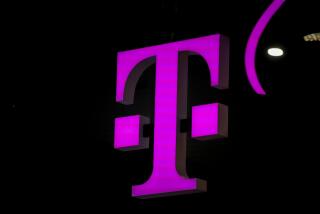AT&T yields to opposition, drops bid to acquire T-Mobile
Reporting from Los Angeles and Washington — Succumbing to mounting opposition from federal regulators, AT&T Inc. abandoned its $39-billion bid to acquire wireless rival T-Mobile USA.
The deal to create the nation’s largest wireless carrier ran aground as antitrust authorities in the Obama administration opposed the takeover bid, arguing that the resulting telecommunications giant would squelch competition and lead to higher prices for consumers.
But in a statement Monday, a defiant AT&T countered that the deal’s collapse could harm consumers by slowing the development of high-speed wireless services. AT&T said combining T-Mobile’s wireless capacity with its own would have helped the industry avoid a shortage of spectrum, the wireless airwaves that carry cellphone calls and data.
“In the absence of such steps, customers will be harmed and needed investment will be stifled,” the statement said.
The pullback will be costly for AT&T, which confirmed that it will pay $4 billion in cash and assets to T-Mobile parent Deutsche Telekom as part of the breakup fee that the two agreed to when the deal was struck in March.
Analysts said the deal had become imperiled months ago when it became clear that AT&T was facing a multi-front battle with state and federal antitrust regulators concerned that the transaction would lead to job losses as the merged company eliminated redundant positions.
“It didn’t surprise me that they pulled the plug,” said Jeffrey S. Silva, a telecommunications analyst with Medley Global Advisors. “They understand the odds that they’re up against.”
The deal’s chances appeared to grow worse over the last few weeks as regulatory developments stacked up against AT&T.
In late November the company opted to withdraw a crucial application from the Federal Communications Commission just as the agency released a report predicting that a merged company would lead to higher monthly bills for consumers and a less-productive wireless industry.
The Justice Department quickly seized on AT&T’s decision to pull out of the FCC review, saying that because AT&T wasn’t seeking FCC approval, the proposed deal was no longer “a real transaction.” Therefore there was no reason to fight it in court. A federal judge agreed and postponed hearing the case, leaving the merger in limbo.
The deal would have combined the nation’s second- and fourth-largest wireless providers, with the resulting company leapfrogging Verizon Wireless to become the market leader. Verizon and the newly enlarged AT&T together would have accounted for 75% of the nation’s wireless customers.
That level of market consolidation alarmed federal authorities, and in late August the Justice Department filed an antitrust suit to block the deal.
AT&T, resolved to fight its case in court, insisted that the merger would benefit consumers by expanding wireless services to rural communities. It also cited studies saying the combined company would create thousands of jobs as it continued to build out its cellular network.
But AT&T may have made a serious miscalculation in pushing ahead with the deal, said Charles Golvin, a wireless analyst at Forrester Research Inc.
“I think that AT&T overreached,” he said, noting that the company’s uphill effort to gain regulatory approval has become a yearlong distraction. In that time, Verizon has strengthened its position as the leading wireless carrier by recently agreeing to a deal with cable companies to acquire more airwaves.
Meanwhile, T-Mobile may be able to use its newfound cash and spectrum to bolster its fourth-place position in the wireless industry, just behind Sprint Nextel Corp., said Christopher Yoo, an antitrust specialist and professor at the University of Pennsylvania Law School.
“It’s not a bad outcome for T-Mobile,” Yoo said. “The breakup penalty actually puts them in a better position to proceed.”
The scuttling of the AT&T deal could mean a new round of merger talks in the wireless industry, Yoo said. That could mean T-Mobile using its bounty to acquire one of the smaller mobile players, such as MetroPCS Communications Inc. or Leap Wireless International Inc., or it could mean that a less dominant company than AT&T — Sprint, for instance — would try its hand at taking over T-Mobile.
“Everyone needs a lot more spectrum, so there’s less room for the smaller players,” Yoo said. “It’s like a game of musical chairs.”
More to Read
Inside the business of entertainment
The Wide Shot brings you news, analysis and insights on everything from streaming wars to production — and what it all means for the future.
You may occasionally receive promotional content from the Los Angeles Times.











